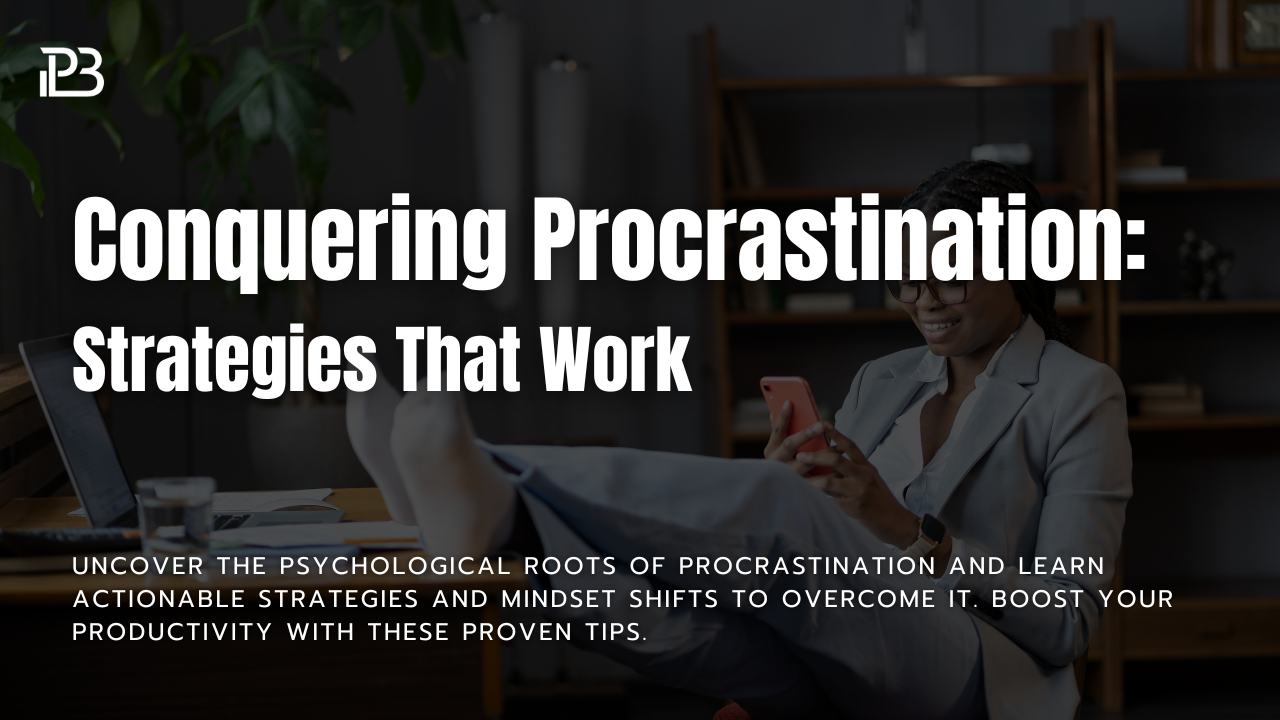Uncover the psychological roots of procrastination and learn actionable strategies and mindset shifts to overcome it. Boost your productivity with these proven tips.
Procrastination, the art of delaying or postponing tasks, is a common hurdle many of us face. It’s not just about poor time management; deeper psychological factors often fuel it. Understanding these roots and employing effective strategies can transform procrastination into productivity. This article explores the psychological underpinnings of procrastination and offers practical advice and mindset shifts to conquer it.
Table of Contents
Understanding the Psychological Roots of Procrastination
Procrastination is not a sign of laziness but often a response to underlying emotions and fears. Anxiety, fear of failure, and perfectionism can lead individuals to avoid tasks they find daunting. This avoidance provides temporary relief from discomfort, reinforcing the cycle of procrastination.
Fear of Failure
The anxiety over not meeting expectations or encountering challenges can be paralyzing, leading to procrastination as a protective mechanism.
Perfectionism
Perfectionists often procrastinate due to their fear that the end product won’t meet their high standards. This can result in a cycle of delay and stress.
Overwhelm
Feeling overwhelmed by the magnitude of a task can lead to avoidance. Breaking tasks into manageable parts can mitigate this trigger.
Strategies to Overcome Procrastination
Break Tasks into Smaller Steps
Large tasks can seem insurmountable. By breaking them down into smaller, more manageable steps, you can reduce the overwhelm and make it easier to start.
Set Clear Deadlines
Self-imposed deadlines can help create a sense of urgency. Be realistic and allow for flexibility to adjust as needed.
Use Time Management Techniques
The Pomodoro Technique, time blocking, and the Eisenhower Box are tools that can help structure your workday and make tasks seem more approachable.
Challenge Perfectionist Thoughts
Recognize when your standards are unreasonably high. Set realistic expectations and remind yourself that progress is more important than perfection.
Address Underlying Fears
Identify the fears that lead to procrastination. Whether it’s fear of failure, criticism, or the unknown, confronting these fears directly can diminish their power.
Mindset Shifts to Combat Procrastination
Embrace Imperfection
Accept that mistakes are part of the learning process. Viewing tasks as opportunities for growth rather than potential failures can alleviate the pressure that fuels procrastination.
Focus on Starting Rather Than Finishing
The hardest part is often just beginning. Commit to taking the first step without worrying about completing the task in one go.
Reward Progress
Set up a reward system for completing tasks or parts of tasks. Rewards can motivate and make the process more enjoyable.
Visualize Success
Imagine the relief and satisfaction of completing your tasks. Visualization can be a powerful motivator to propel you into action.
Recommended Reading to Enhance Your Journey
As you embark on the journey to conquer procrastination, equipping yourself with comprehensive resources can be incredibly beneficial. One highly recommended book that delves deep into the psychology of procrastination and offers practical, transformative strategies is “The Now Habit” by Neil Fiore.
“The Now Habit”: A Wealth of Insight
Neil Fiore’s “The Now Habit” stands out as a seminal work in the field of productivity and self-help. Fiore, a renowned psychologist, explores the triggers of procrastination, not just as a time management issue but as a complex psychological behavior rooted in our fear of failure, perfectionism, and the overwhelming pressure of expectations.
What Makes “The Now Habit” Essential Reading?
- Practical Strategies: Fiore provides actionable techniques to break the cycle of procrastination. These strategies are designed to be implemented easily into daily routines, making them accessible to everyone, regardless of their workload or lifestyle.
- Understanding Procrastination: The book offers deep insights into why we procrastinate, making it easier to identify personal triggers and address them effectively.
- Transforming Your Relationship with Work: “The Now Habit” doesn’t just aim to make you more productive; it seeks to change how you perceive work and tasks. By fostering a healthier mindset towards work, Fiore helps readers find joy and satisfaction in their accomplishments.
- Building a New Framework: Through a series of exercises and self-reflection, readers can construct a personal framework for action that prioritizes meaningful work, sets realistic goals, and fosters a sense of achievement.
Why “The Now Habit” Is a Must-Read
For anyone struggling with procrastination, “The Now Habit” provides more than just tips for being productive. It offers a path to transforming your work habits and, by extension, your life. Fiore’s compassionate approach emphasizes the importance of self-forgiveness and understanding, setting the stage for lasting change.
Incorporating Fiore’s insights and strategies can significantly complement the actionable steps and mindset shifts discussed in conquering procrastination. Whether you’re a student, a professional, or simply seeking to improve your daily life, “The Now Habit” equips you with the tools to break free from procrastination and embrace a more proactive, fulfilled life.
Related reading:
- Marcus Aurelius’ Timeless Wisdom: Embrace the Moment and “Waste No More Time”
- Mastering Focus with the Pomodoro Technique: A Comprehensive Guide
Conclusion
Procrastination is a complex issue with deep psychological roots, but it’s not insurmountable. By understanding the underlying causes and employing targeted strategies and mindset shifts, you can overcome procrastination and unlock higher productivity levels. Remember, the goal isn’t to eliminate procrastination but to manage it in a way that allows you to progress toward your objectives with confidence and clarity.





Pingback: The Best Productivity Apps For Skyrocketing Your Productivity - Project Lion's Blueprint
Pingback: Time Blocking: The Secret to Unmatched Productivity - Project Lion's Blueprint
Pingback: Enhancing Productivity with Mindfulness Practices - Project Lion's Blueprint